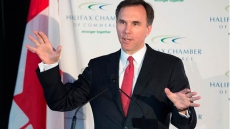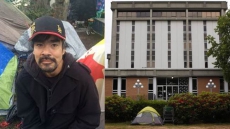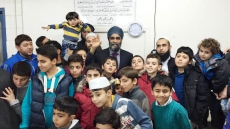OTTAWA — A new study says approximately half of military personnel in Canada begin their service with a history of abuse in their childhood, including corporal punishment, or witnessed domestic violence as children.
The research, conducted by the Department of National Defence and the University of Manitoba, also found that exposure to child abuse and trauma among soldiers is proportionally higher than in the civilian population.
Health specialists were looking to understand the factors driving the series of suicides that has gripped the military.
The Canadian Press reported on the initial findings of the study a year ago after it was presented at a military medical conference, but the research was finalized and published Wednesday in The Journal of the American Medical Association - Psychiatry.
The study reports that child abuse exposure was higher in the regular forces — at 47.7 per cent — and higher still in reserve forces with 49.4 per cent, compared with 33.1 per cent in the Canadian general population.
"Regular Forces personnel were more likely than the (general population) to have experienced all types of child abuse exposure with the exception of sexual abuse among males," said the report.
"Reserve Forces personnel were more likely than the (general population) to have experienced any physical abuse and exposure to intimate partner violence (with the exception of females for the exposure to intimate partner violence only); sexual abuse was more likely in the reserve Forces compared with the (general population) among females in the higher income category only."
Why almost half of all military personnel in Canada have a history of child abuse exposure is not something the study was able to determine, the authors said.
Significantly, the analysis concludes the link between child abuse exposure and suicide was often "significantly weaker" in military personnel compared to civilians. But trauma early in life combined with witnessing horrors overseas does have an "effect on past-year suicidal ideation and suicide plans."
The report says the findings are significant for both soldiers and civilians, but recommends suicide prevention efforts be aimed at those who've suffered childhood trauma.

Abuse is defined in the report as being kicked, bitten, punched, choked, burned or attacked as youngsters, including sexual violence. It also includes the trauma of having witnessed "intimate partner violence" while growing up.
The new study relies on data in the mental-health portion of the 2012 Canadian Community Health Survey, which questioned more than 25,000 people, and the 2013 Canadian Forces Mental Health Survey, which is based on responses from more than 8,100 members of the military.
It follows a major study in the U.S. three years ago by the mental-health research branch of the Veterans Administration, Duke University and the University of Alabama. That research concluded that abuse, neglect and other childhood ordeals were major contributors to mental-health problems suffered by soldiers later in life.
In 2014, the Canadian Forces surgeon general Brig.-Gen. Jean-Robert Bernier told a Commons committee that the mental health of soldiers was an issue the military was struggling to understand. He pointed to the extraordinarily high rate of depression among serving members.
The new research may shed more light on that.




